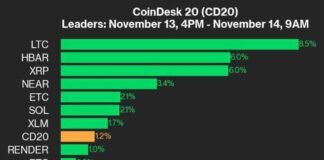The Hong Kong Securities and Futures Commission (SFC) is taking steps to establish a consultative panel for licensed cryptocurrency exchanges in the city. Eric Yip, the SFC’s Executive Director, Intermediaries, announced this plan during Hong Kong Fintech Week on Oct. 28.
Yip mentioned that the panel would consist of representatives from each licensed exchange, aiming to promote transparency and shared responsibility within the crypto community. The goal is to develop a roadmap for crypto products and services, as well as enhance compliance and risk management practices.
This initiative is part of Hong Kong’s broader efforts to create a comprehensive regulatory framework for digital assets. The city recently introduced a licensing regime for virtual asset trading platforms, with three platforms currently holding licenses. Additionally, the SFC is reviewing applications from 14 more platforms, 11 of which already have existing businesses in Hong Kong. Yip expressed optimism about granting more licenses by the end of the year.
However, Yip also highlighted the importance of investor protection in the rapidly evolving crypto space. Investment fraud and scams have been a significant concern in Hong Kong, with losses amounting to HK$1.5 billion ($193 million) in the first half of the year. While the extent of crypto-related fraud cases is not specified, previous data indicates that such incidents have contributed significantly to investment fraud losses.
Despite efforts to regulate the crypto market, challenges remain, with some major exchanges opting out of the licensing process in Hong Kong. This has led to a situation where retail traders continue to use unlicensed overseas exchanges due to limited token availability and the absence of complex financial products on licensed platforms. Yip emphasized the need for regulators to adapt and address market dynamics to ensure a balance between regulatory oversight and market development.
Looking ahead, Yip called for global cooperation among regulators to prevent regulatory arbitrage by exchanges. He stressed the importance of listening to market feedback and finding the right balance between regulatory standards and fostering market growth.
In conclusion, the establishment of a consultative panel for licensed crypto exchanges in Hong Kong reflects the SFC’s commitment to building a regulated marketplace that safeguards investor interests while supporting innovation in the digital asset space. As the regulatory landscape continues to evolve, collaboration and adaptability will be key to ensuring the long-term sustainability of the crypto industry in Hong Kong and beyond.

















